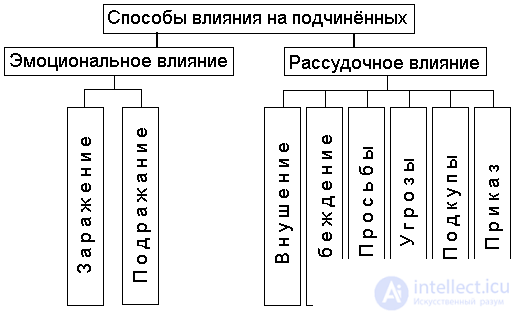Lecture
The work of a manager * comes down to the fact that he forces others to do something the way he wants. Because of paramount importance here is the effective use of leader status, influence and power. Even in the XVII century, Niccolo Machiavelli in his work "Prince" pointed out that power and manipulation of it are the levers of government.
Power is a right that a person possesses due to the official position that he occupies in the organizational structure. Power, if viewed from this point of view, is interpersonal in nature and has nothing to do with the particular person occupying his position. On the contrary, authority * is personified to a large extent and is related to a person’s ability to achieve tasks by influencing other people. Thus, authority is a direct result of the impact of a person’s personality.
There are examples when high-ranking managers, invested with all the rights that accompany positions in the corridors of the executive branch, seem to have little authority or ability to influence others. There are also many people who do not have a formal right to influence others, who nevertheless became extremely influential.
The power of the leader can take a variety of forms. Thus, according to the classification of French and Raven, it has five main forms:
The manager * has authority over subordinates, but in some situations subordinates have authority over the leader, since the latter depends on them on issues such as information necessary for decision-making, informal contacts with people in other departments, etc. It follows that the manager must understand and take into account the fact that since subordinates also often have power, their unilateral use of their power in full can provoke such a reaction from subordinates when they want to demonstrate their own power. Therefore, a reasonable balance of power should be maintained: sufficient to achieve the goals of the organization, but not causing subordinate negative reactions (Fig. 6.12).
|
The power of the head over subordinates |
The power of subordinates over the head |
|
|
Dependence of subordinates from the head |
The dependence of the head of subordinates |
Fig. 6. 12. Balancing the power of managers and subordinates.
In all cases when we are dealing with power, we mean the degree of the manager’s influence on the subordinate. Influence is the behavior of one individual, which makes a change in the behavior of another. The process of influence of the head on the subordinate is shown in fig. 6.13.

Fig. 6 .13. The model of influence of the head on the subordinate.
Specific methods of influence are very diverse and are presented in Fig. 6.14.

Fig. 6. 14. Methods of managerial influence on subordinates.
Authority * , as already mentioned, is the most important factor of personal influence.
Authority is a well-deserved trust that a manager enjoys from subordinates, senior management and work colleagues, recognition of the personality, and the team's assessment of the manager’s subjective qualities to meet objective requirements . The authority of a manager associated with the performance of his basic functions in accordance with his position must be supported by personal example and high moral character. In this sense, two sources (status) of authority should be distinguished: official, determined by the position held (official status); real authority - actual influence, real trust and respect (subjective status).
A leader who has authority, has people to himself, has a positive effect on them.
Caring for the authority of the leader is not only his own business, but also the top management, and the leader of the same level, and especially his subordinates, who are called upon to strengthen him, protect and enhance him. Authority should be considered as a factor facilitating management * , increasing its efficiency.
Strengthening authority, the manager needs to ensure that he does not suppress them, does not constrain the initiative of subordinates. Artificial methods of forming authority do not lead to success; as a result, an imaginary, or false authority (pseudo-auto authority) appears. A. S. Makarenko distinguished the following types of pseudo-authoritativeness:
authority of distance - the leader believes that his authority increases if he distances himself from his subordinates and keeps with them officially;
the authority of kindness - "Always be kind" - such is the credo of this leader. Kindness reduces exactingness;
authority of pedantry - in this case, the manager resorts to petty care and rigidly determines all stages of the assignment of subordinates, thereby restricting their creativity and initiative;
the authority of swagger — the leader is arrogant, proud, and tries to emphasize everywhere his former or imaginary present merits. It seems to such a leader that these "merits" provide him with high authority;
the authority of repression - the manager resorts to threats, sows fear among his subordinates. He mistakenly believes that such techniques will strengthen his authority. In the end, it deprives people of confidence, initiative, reinsurance and even dishonesty.
Proper formation and strengthening of the authority of the manager contributes to the management of conflicts * and stress, which will be discussed below.
Comments
To leave a comment
Management
Terms: Management